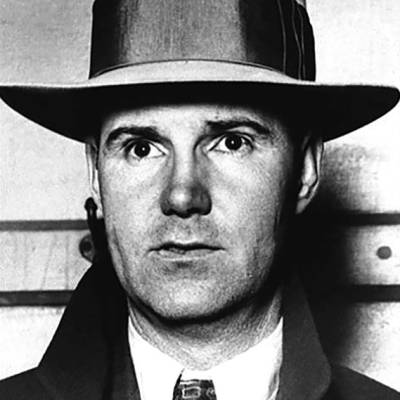
Titanic Thompson
Childhood
Born in Monett, Missouri, in 1893, Alvin's early life was far removed from the high-stakes poker rooms and swanky golf courses he would later frequent. Raised in the Ozark Mountains near Rogers, Arkansas, his childhood was marked by his father's desertion and his mother's remarriage. Young Alvin found little comfort in his stepfather's home and sporadic schooling left him unable to read or write proficiently. Instead, he honed skills that would become his tools of the trade. His uncles recognized his uncanny accuracy with a firearm, a talent that would later serve him in more ways than one. He also spent countless hours dealing cards, developing an innate understanding of odds and probabilities. By the age of 16, armed with little more than raw talent and a burning desire to make his own way, he left home, embarking on his nomadic and surprisingly lucrative career.
Career
Titanic Thompson excelled at proposition bets and various games of chance, including cards, dice, golf, shooting, billiards, and horseshoes. His ambidexterity in golf and cards, sharp shooting, and pool skills earned him comparisons to "Merlin." Thompson's genius lay in exploiting vulnerabilities with theatrical deception, wagering on seemingly impossible feats like throwing a weighted walnut over a building or accurately tossing a key into a lock. He famously moved a road sign to win a mileage bet and used a frozen lake to achieve a 500-yard golf drive.
Partnering with figures like Minnesota Fats, who called him "the greatest action man of all time," Thompson admitted his weakness was horse racing, where he lost millions.
A gifted athlete, Thompson became an expert golfer, good enough to turn professional, but declined due to the potential pay cut. Ben Hogan considered him the best shotmaker he'd ever seen, highlighting his ambidextrous skill.
Early in his career, Thompson earned money with trick shooting for a medicine show. Years later, he won four consecutive Arizona State Trapshooting Championships. Even his military service during World War I became a gambling opportunity, earning him over $50,000 from fellow draftees.
Personal life
Thompson's personal life was as colorful and transient as his gambling career. He married five times and fathered three sons with three different wives. He was also romantically linked to numerous women, including Hollywood actresses Myrna Loy and Jean Harlow. His pattern often involved marrying a younger woman, living with her for a short period, and then returning to his nomadic hustling life, leaving his ex-wives with comfortable housing and financial support.
Revenue
Estimating Titanic Thompson's exact revenue is impossible. He operated largely outside the formal economy, his earnings fluctuating wildly based on his skill, cunning, and luck. He undoubtedly won and lost vast sums of money throughout his life. While he experienced periods of considerable wealth, his weakness for horse racing likely offset many of his winnings. His ability to consistently extract money from unsuspecting marks and skilled opponents alike suggests a substantial, albeit volatile, income.
Interesting facts
The Nickname: Two main accounts of the origin of his "Titanic" moniker exist. One, recounted by Thompson himself, claims it arose after he beat a pool player named Snow Clark and then made a daring jump across the pool table. Clark supposedly quipped, "It must be Titanic. He sinks everybody." The other, attributed to Minnesota Fats, humorously suggests it came from him surviving the Titanic disaster by dressing as a woman. The former story is generally considered the more plausible.
Involvement in the "Crime of the Century": In 1928, Thompson was a participant in the high-stakes poker game that preceded the murder of New York City crime boss Arnold Rothstein. Thompson, along with Nate Raymond, was allegedly responsible for fixing the game, leaving Rothstein with massive debts. He later testified in the trial of George McManus, who was accused of Rothstein's murder but was acquitted. Thompson maintained he knew the real killer was Rothstein's bodyguard.
The Muse for Sky Masterson: Famed writer Damon Runyon is believed to have based the charismatic gambler-hero Sky Masterson in his story "The Idyll of Miss Sarah Brown" (which inspired the musical "Guys and Dolls") on the larger-than-life persona of Titanic Thompson.
Mentoring Golf Legends: Thompson often partnered with promising young golfers for money games in his later years. Several of these players, including Ben Hogan, Ky Laffoon, Herman Keiser, and Lee Elder, became PGA Tour stars and World Golf Hall of Fame inductees.
Five Killings: Thompson was involved in the deaths of five men, all of whom he claimed were in self-defense. He was never charged in any of the killings. One incident involved a man accusing him of cheating at dice, while the other four occurred during attempted robberies of his gambling winnings. In one instance, the local police even thanked him for killing two wanted bank robbers.
Legacy
Titanic Thompson's legacy transcends mere gambling wins and losses. He embodies the archetype of the cunning, self-made hustler who navigated the fringes of society with audacity and skill. His incredible talent across various games, his legendary proposition bets, and his brushes with the law and the underworld have cemented his place as a mythic figure in American gambling history. He represents a bygone era of road gamblers and high-stakes action, a testament to the power of skill, nerve, and a willingness to bet on anything.
Frequently asked Questions
Titanic Thompson, born Alvin Clarence Thomas, was a legendary American gambler, golfer, and hustler known for his exceptional skills in various games and his penchant for elaborate proposition bets. He traveled the country, wagering on everything from cards and dice to golf and shooting, often using his ambidexterity and cunning to gain an advantage.
According to his own account, he earned the nickname in 1912 after winning a pool game and then making a daring jump across the table. A spectator remarked that he "sinks everybody," likening him to the ill-fated Titanic liner. Another less credible story suggests he survived the Titanic disaster by dressing as a woman.
While he possessed the skill to turn professional, Titanic Thompson never did. He reportedly made more money hustling wealthy amateur golfers than he would have earned on the professional tour. Legendary golfer Ben Hogan considered him one of the best shotmakers he had ever seen.
Thompson was present at the high-stakes poker game that preceded the murder of Arnold Rothstein in 1928 and later testified in the murder trial. He was also involved in the deaths of five men, all of whom he claimed were in self-defense, and was never charged in any of these incidents.
While he married five times, Thompson largely lived a nomadic life, traveling the country to pursue gambling opportunities. He spent his final years in a nursing home near Dallas.
















